Leadership Characteristics of Barack Obama: An Essay Analysis, USA
VerifiedAdded on 2020/04/15
|7
|1492
|908
Essay
AI Summary
This essay provides an in-depth analysis of the leadership characteristics exhibited by Barack Obama during his presidency. The essay begins with an introduction highlighting Obama's historical significance as the first African-American president of the United States and his notable achievements, such as navigating the country through an economic recession and expanding healthcare access through the Affordable Care Act. The core of the essay focuses on key leadership traits, including effective communication, self-motivation, confidence, courage, and responsibility, supported by examples from Obama's time in office. It emphasizes how Obama's communication skills enabled him to articulate his vision, his self-confidence and motivation helped him make decisive decisions, his courage allowed him to make bold moves, and his sense of responsibility ensured accountability for his actions. The essay concludes by underscoring the importance of these characteristics in developing great leaders and promoting effective leadership, referencing Obama's Nobel Peace Prize as recognition of his global leadership skills.
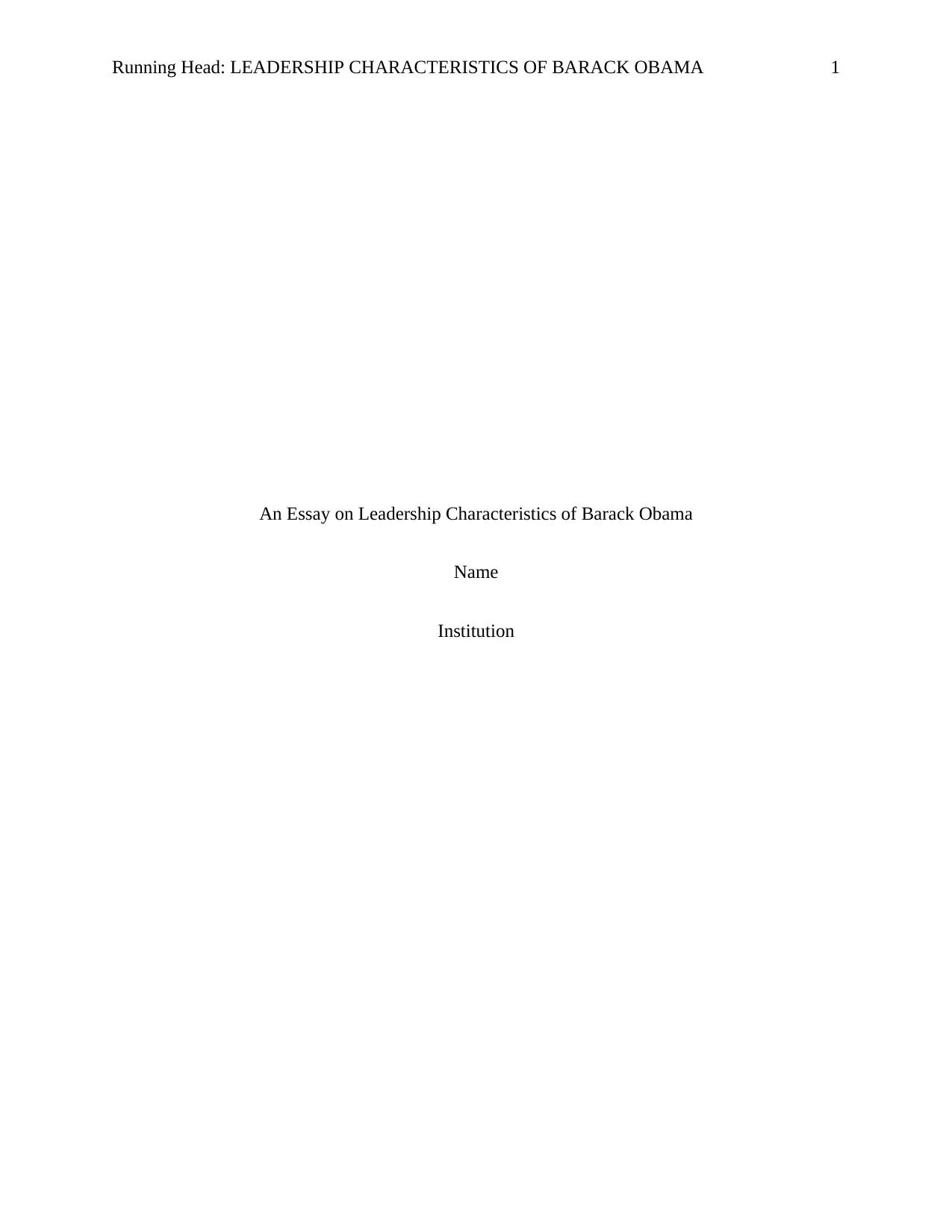
Running Head: LEADERSHIP CHARACTERISTICS OF BARACK OBAMA 1
An Essay on Leadership Characteristics of Barack Obama
Name
Institution
An Essay on Leadership Characteristics of Barack Obama
Name
Institution
Paraphrase This Document
Need a fresh take? Get an instant paraphrase of this document with our AI Paraphraser
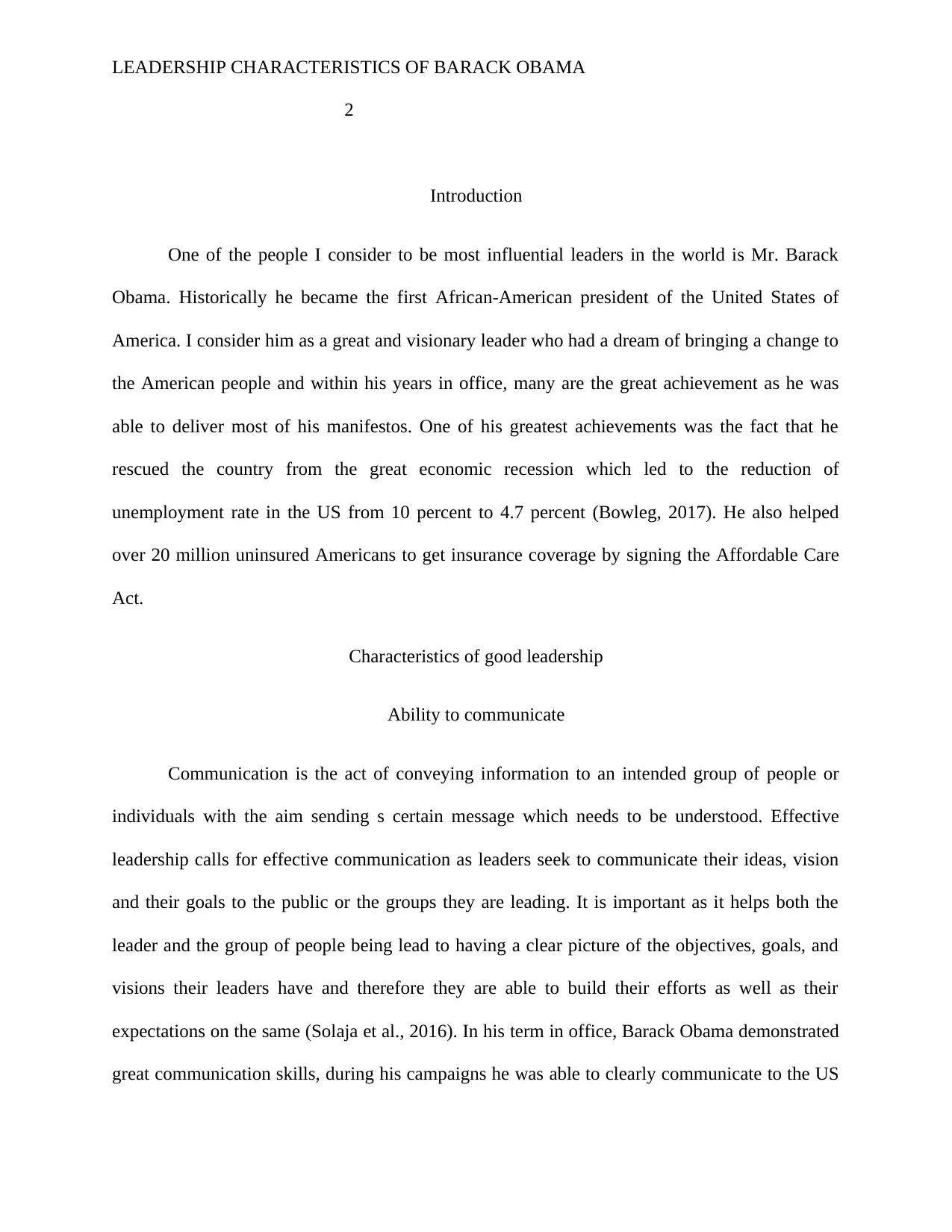
LEADERSHIP CHARACTERISTICS OF BARACK OBAMA
2
Introduction
One of the people I consider to be most influential leaders in the world is Mr. Barack
Obama. Historically he became the first African-American president of the United States of
America. I consider him as a great and visionary leader who had a dream of bringing a change to
the American people and within his years in office, many are the great achievement as he was
able to deliver most of his manifestos. One of his greatest achievements was the fact that he
rescued the country from the great economic recession which led to the reduction of
unemployment rate in the US from 10 percent to 4.7 percent (Bowleg, 2017). He also helped
over 20 million uninsured Americans to get insurance coverage by signing the Affordable Care
Act.
Characteristics of good leadership
Ability to communicate
Communication is the act of conveying information to an intended group of people or
individuals with the aim sending s certain message which needs to be understood. Effective
leadership calls for effective communication as leaders seek to communicate their ideas, vision
and their goals to the public or the groups they are leading. It is important as it helps both the
leader and the group of people being lead to having a clear picture of the objectives, goals, and
visions their leaders have and therefore they are able to build their efforts as well as their
expectations on the same (Solaja et al., 2016). In his term in office, Barack Obama demonstrated
great communication skills, during his campaigns he was able to clearly communicate to the US
2
Introduction
One of the people I consider to be most influential leaders in the world is Mr. Barack
Obama. Historically he became the first African-American president of the United States of
America. I consider him as a great and visionary leader who had a dream of bringing a change to
the American people and within his years in office, many are the great achievement as he was
able to deliver most of his manifestos. One of his greatest achievements was the fact that he
rescued the country from the great economic recession which led to the reduction of
unemployment rate in the US from 10 percent to 4.7 percent (Bowleg, 2017). He also helped
over 20 million uninsured Americans to get insurance coverage by signing the Affordable Care
Act.
Characteristics of good leadership
Ability to communicate
Communication is the act of conveying information to an intended group of people or
individuals with the aim sending s certain message which needs to be understood. Effective
leadership calls for effective communication as leaders seek to communicate their ideas, vision
and their goals to the public or the groups they are leading. It is important as it helps both the
leader and the group of people being lead to having a clear picture of the objectives, goals, and
visions their leaders have and therefore they are able to build their efforts as well as their
expectations on the same (Solaja et al., 2016). In his term in office, Barack Obama demonstrated
great communication skills, during his campaigns he was able to clearly communicate to the US
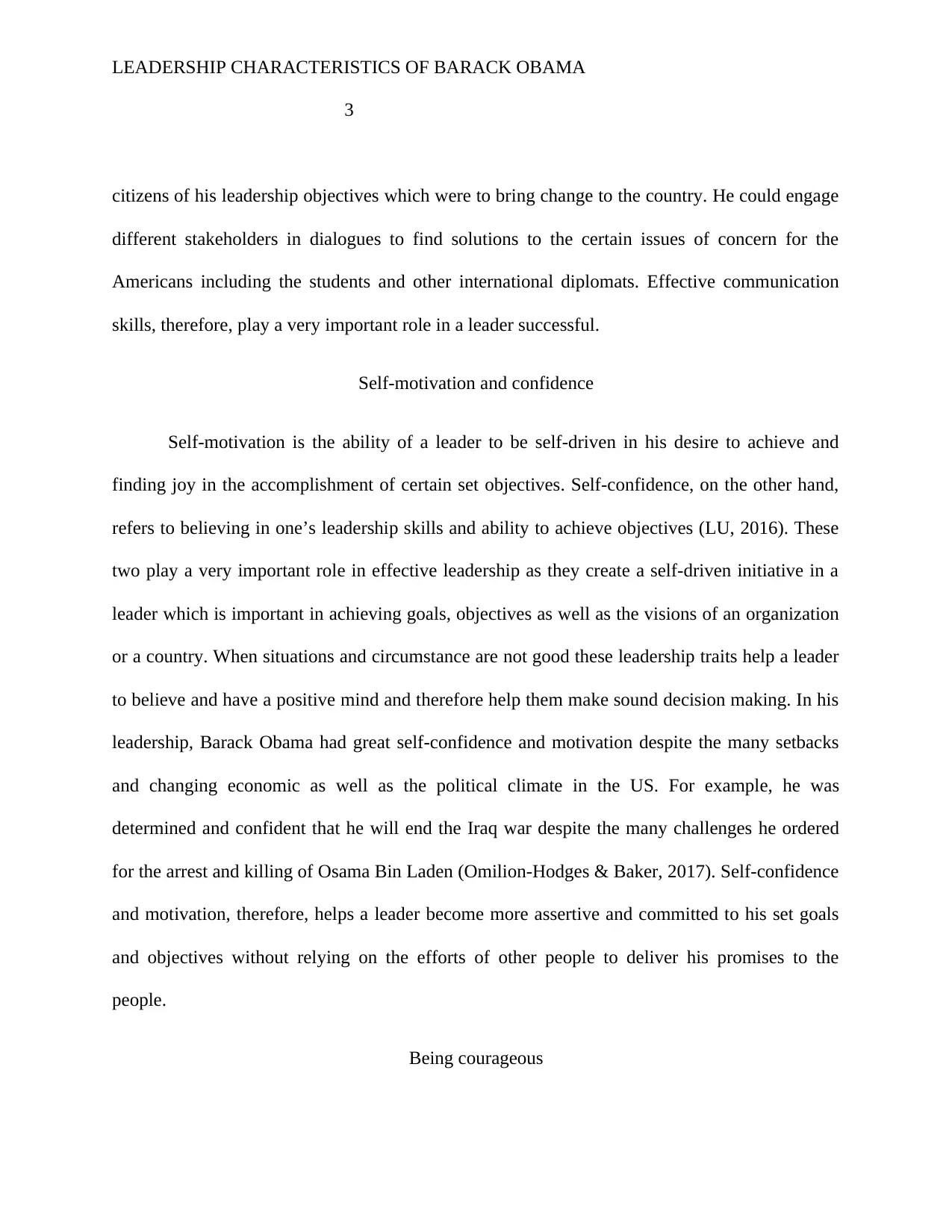
LEADERSHIP CHARACTERISTICS OF BARACK OBAMA
3
citizens of his leadership objectives which were to bring change to the country. He could engage
different stakeholders in dialogues to find solutions to the certain issues of concern for the
Americans including the students and other international diplomats. Effective communication
skills, therefore, play a very important role in a leader successful.
Self-motivation and confidence
Self-motivation is the ability of a leader to be self-driven in his desire to achieve and
finding joy in the accomplishment of certain set objectives. Self-confidence, on the other hand,
refers to believing in one’s leadership skills and ability to achieve objectives (LU, 2016). These
two play a very important role in effective leadership as they create a self-driven initiative in a
leader which is important in achieving goals, objectives as well as the visions of an organization
or a country. When situations and circumstance are not good these leadership traits help a leader
to believe and have a positive mind and therefore help them make sound decision making. In his
leadership, Barack Obama had great self-confidence and motivation despite the many setbacks
and changing economic as well as the political climate in the US. For example, he was
determined and confident that he will end the Iraq war despite the many challenges he ordered
for the arrest and killing of Osama Bin Laden (Omilion-Hodges & Baker, 2017). Self-confidence
and motivation, therefore, helps a leader become more assertive and committed to his set goals
and objectives without relying on the efforts of other people to deliver his promises to the
people.
Being courageous
3
citizens of his leadership objectives which were to bring change to the country. He could engage
different stakeholders in dialogues to find solutions to the certain issues of concern for the
Americans including the students and other international diplomats. Effective communication
skills, therefore, play a very important role in a leader successful.
Self-motivation and confidence
Self-motivation is the ability of a leader to be self-driven in his desire to achieve and
finding joy in the accomplishment of certain set objectives. Self-confidence, on the other hand,
refers to believing in one’s leadership skills and ability to achieve objectives (LU, 2016). These
two play a very important role in effective leadership as they create a self-driven initiative in a
leader which is important in achieving goals, objectives as well as the visions of an organization
or a country. When situations and circumstance are not good these leadership traits help a leader
to believe and have a positive mind and therefore help them make sound decision making. In his
leadership, Barack Obama had great self-confidence and motivation despite the many setbacks
and changing economic as well as the political climate in the US. For example, he was
determined and confident that he will end the Iraq war despite the many challenges he ordered
for the arrest and killing of Osama Bin Laden (Omilion-Hodges & Baker, 2017). Self-confidence
and motivation, therefore, helps a leader become more assertive and committed to his set goals
and objectives without relying on the efforts of other people to deliver his promises to the
people.
Being courageous
⊘ This is a preview!⊘
Do you want full access?
Subscribe today to unlock all pages.

Trusted by 1+ million students worldwide
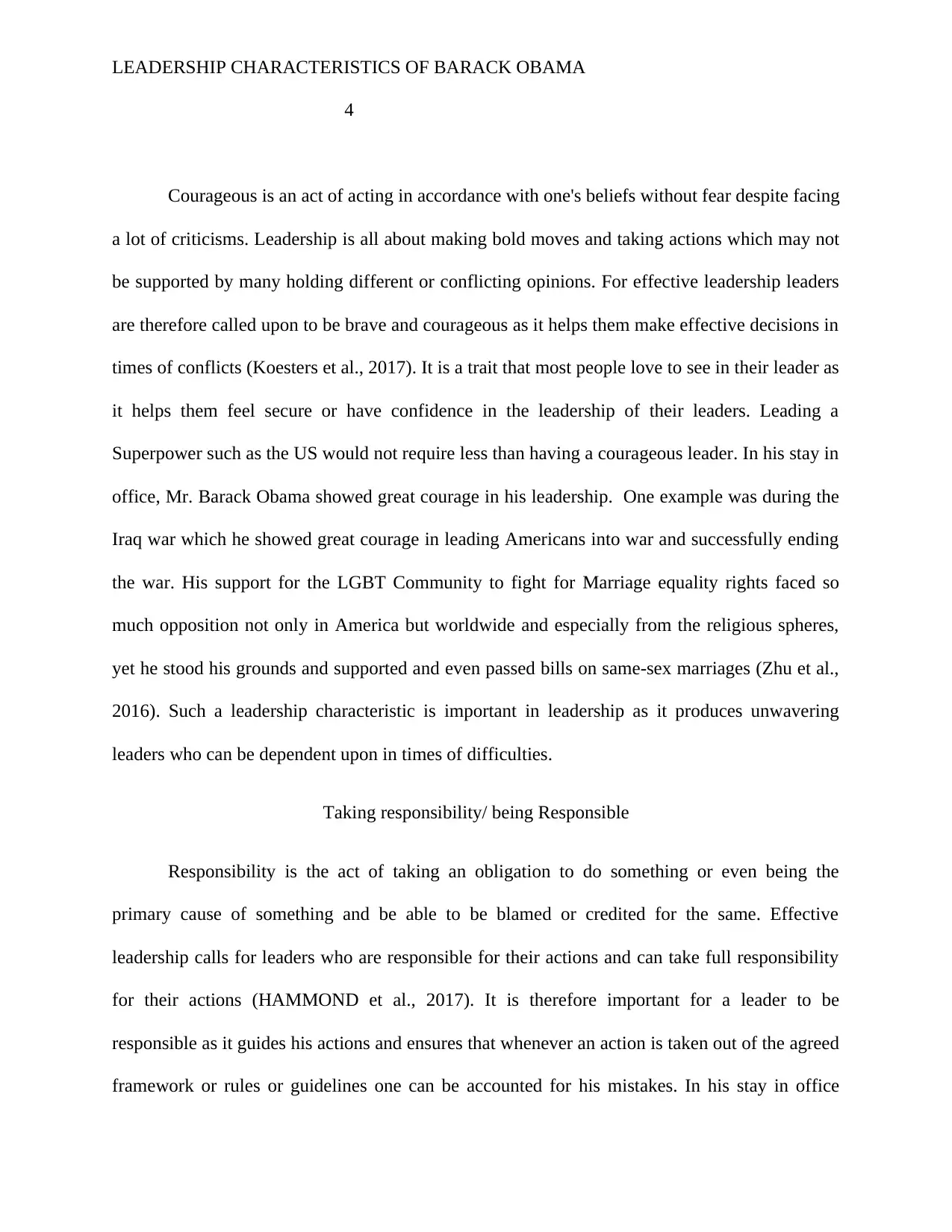
LEADERSHIP CHARACTERISTICS OF BARACK OBAMA
4
Courageous is an act of acting in accordance with one's beliefs without fear despite facing
a lot of criticisms. Leadership is all about making bold moves and taking actions which may not
be supported by many holding different or conflicting opinions. For effective leadership leaders
are therefore called upon to be brave and courageous as it helps them make effective decisions in
times of conflicts (Koesters et al., 2017). It is a trait that most people love to see in their leader as
it helps them feel secure or have confidence in the leadership of their leaders. Leading a
Superpower such as the US would not require less than having a courageous leader. In his stay in
office, Mr. Barack Obama showed great courage in his leadership. One example was during the
Iraq war which he showed great courage in leading Americans into war and successfully ending
the war. His support for the LGBT Community to fight for Marriage equality rights faced so
much opposition not only in America but worldwide and especially from the religious spheres,
yet he stood his grounds and supported and even passed bills on same-sex marriages (Zhu et al.,
2016). Such a leadership characteristic is important in leadership as it produces unwavering
leaders who can be dependent upon in times of difficulties.
Taking responsibility/ being Responsible
Responsibility is the act of taking an obligation to do something or even being the
primary cause of something and be able to be blamed or credited for the same. Effective
leadership calls for leaders who are responsible for their actions and can take full responsibility
for their actions (HAMMOND et al., 2017). It is therefore important for a leader to be
responsible as it guides his actions and ensures that whenever an action is taken out of the agreed
framework or rules or guidelines one can be accounted for his mistakes. In his stay in office
4
Courageous is an act of acting in accordance with one's beliefs without fear despite facing
a lot of criticisms. Leadership is all about making bold moves and taking actions which may not
be supported by many holding different or conflicting opinions. For effective leadership leaders
are therefore called upon to be brave and courageous as it helps them make effective decisions in
times of conflicts (Koesters et al., 2017). It is a trait that most people love to see in their leader as
it helps them feel secure or have confidence in the leadership of their leaders. Leading a
Superpower such as the US would not require less than having a courageous leader. In his stay in
office, Mr. Barack Obama showed great courage in his leadership. One example was during the
Iraq war which he showed great courage in leading Americans into war and successfully ending
the war. His support for the LGBT Community to fight for Marriage equality rights faced so
much opposition not only in America but worldwide and especially from the religious spheres,
yet he stood his grounds and supported and even passed bills on same-sex marriages (Zhu et al.,
2016). Such a leadership characteristic is important in leadership as it produces unwavering
leaders who can be dependent upon in times of difficulties.
Taking responsibility/ being Responsible
Responsibility is the act of taking an obligation to do something or even being the
primary cause of something and be able to be blamed or credited for the same. Effective
leadership calls for leaders who are responsible for their actions and can take full responsibility
for their actions (HAMMOND et al., 2017). It is therefore important for a leader to be
responsible as it guides his actions and ensures that whenever an action is taken out of the agreed
framework or rules or guidelines one can be accounted for his mistakes. In his stay in office
Paraphrase This Document
Need a fresh take? Get an instant paraphrase of this document with our AI Paraphraser
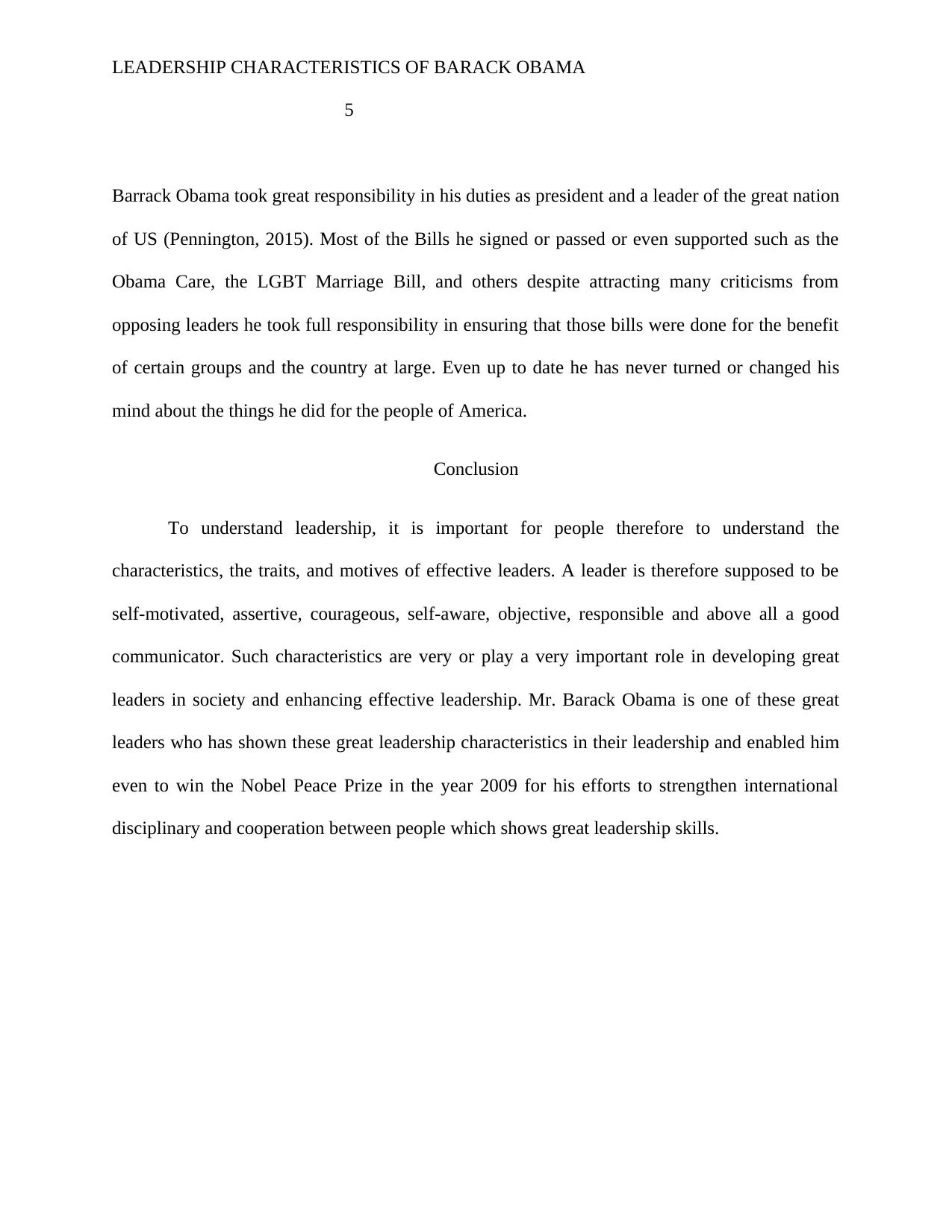
LEADERSHIP CHARACTERISTICS OF BARACK OBAMA
5
Barrack Obama took great responsibility in his duties as president and a leader of the great nation
of US (Pennington, 2015). Most of the Bills he signed or passed or even supported such as the
Obama Care, the LGBT Marriage Bill, and others despite attracting many criticisms from
opposing leaders he took full responsibility in ensuring that those bills were done for the benefit
of certain groups and the country at large. Even up to date he has never turned or changed his
mind about the things he did for the people of America.
Conclusion
To understand leadership, it is important for people therefore to understand the
characteristics, the traits, and motives of effective leaders. A leader is therefore supposed to be
self-motivated, assertive, courageous, self-aware, objective, responsible and above all a good
communicator. Such characteristics are very or play a very important role in developing great
leaders in society and enhancing effective leadership. Mr. Barack Obama is one of these great
leaders who has shown these great leadership characteristics in their leadership and enabled him
even to win the Nobel Peace Prize in the year 2009 for his efforts to strengthen international
disciplinary and cooperation between people which shows great leadership skills.
5
Barrack Obama took great responsibility in his duties as president and a leader of the great nation
of US (Pennington, 2015). Most of the Bills he signed or passed or even supported such as the
Obama Care, the LGBT Marriage Bill, and others despite attracting many criticisms from
opposing leaders he took full responsibility in ensuring that those bills were done for the benefit
of certain groups and the country at large. Even up to date he has never turned or changed his
mind about the things he did for the people of America.
Conclusion
To understand leadership, it is important for people therefore to understand the
characteristics, the traits, and motives of effective leaders. A leader is therefore supposed to be
self-motivated, assertive, courageous, self-aware, objective, responsible and above all a good
communicator. Such characteristics are very or play a very important role in developing great
leaders in society and enhancing effective leadership. Mr. Barack Obama is one of these great
leaders who has shown these great leadership characteristics in their leadership and enabled him
even to win the Nobel Peace Prize in the year 2009 for his efforts to strengthen international
disciplinary and cooperation between people which shows great leadership skills.
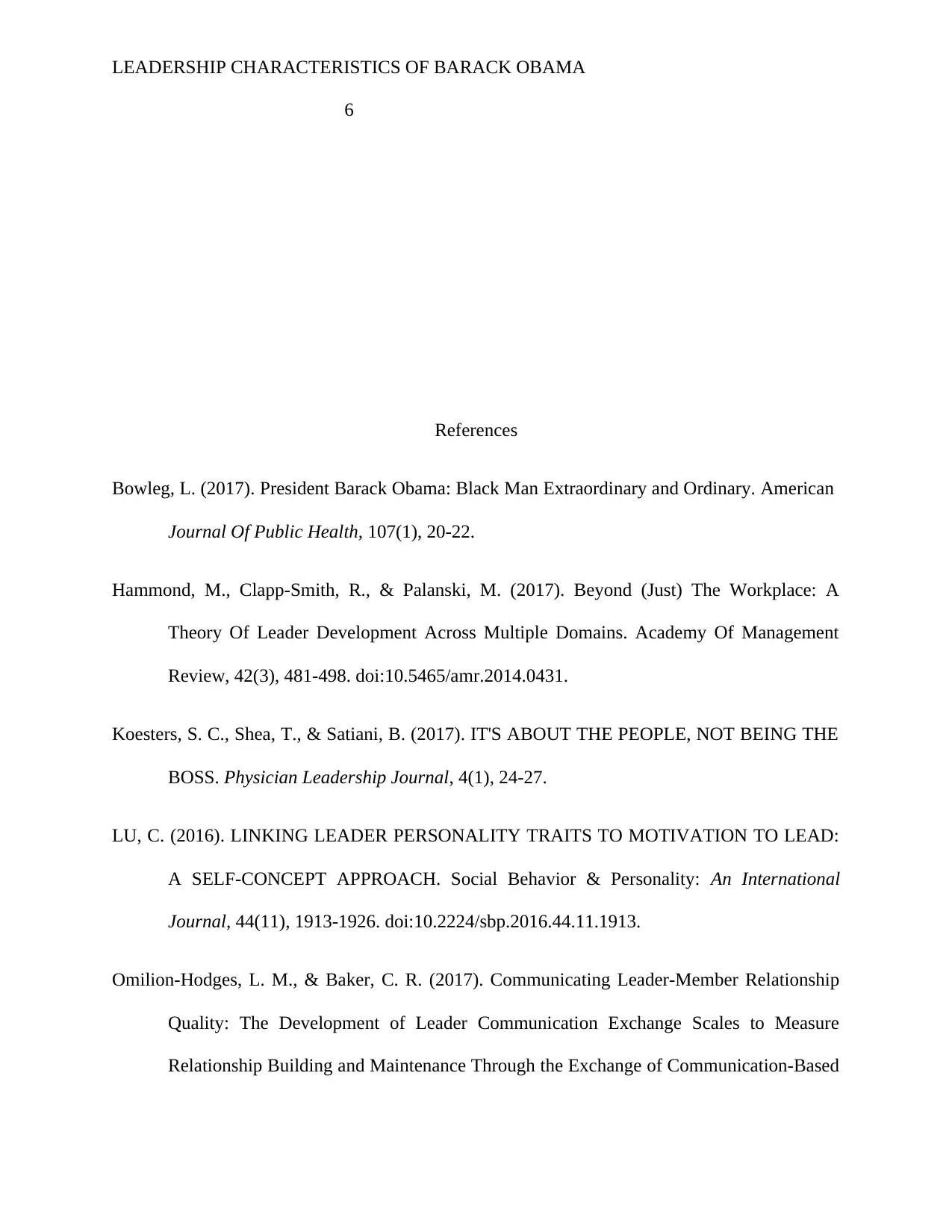
LEADERSHIP CHARACTERISTICS OF BARACK OBAMA
6
References
Bowleg, L. (2017). President Barack Obama: Black Man Extraordinary and Ordinary. American
Journal Of Public Health, 107(1), 20-22.
Hammond, M., Clapp-Smith, R., & Palanski, M. (2017). Beyond (Just) The Workplace: A
Theory Of Leader Development Across Multiple Domains. Academy Of Management
Review, 42(3), 481-498. doi:10.5465/amr.2014.0431.
Koesters, S. C., Shea, T., & Satiani, B. (2017). IT'S ABOUT THE PEOPLE, NOT BEING THE
BOSS. Physician Leadership Journal, 4(1), 24-27.
LU, C. (2016). LINKING LEADER PERSONALITY TRAITS TO MOTIVATION TO LEAD:
A SELF-CONCEPT APPROACH. Social Behavior & Personality: An International
Journal, 44(11), 1913-1926. doi:10.2224/sbp.2016.44.11.1913.
Omilion-Hodges, L. M., & Baker, C. R. (2017). Communicating Leader-Member Relationship
Quality: The Development of Leader Communication Exchange Scales to Measure
Relationship Building and Maintenance Through the Exchange of Communication-Based
6
References
Bowleg, L. (2017). President Barack Obama: Black Man Extraordinary and Ordinary. American
Journal Of Public Health, 107(1), 20-22.
Hammond, M., Clapp-Smith, R., & Palanski, M. (2017). Beyond (Just) The Workplace: A
Theory Of Leader Development Across Multiple Domains. Academy Of Management
Review, 42(3), 481-498. doi:10.5465/amr.2014.0431.
Koesters, S. C., Shea, T., & Satiani, B. (2017). IT'S ABOUT THE PEOPLE, NOT BEING THE
BOSS. Physician Leadership Journal, 4(1), 24-27.
LU, C. (2016). LINKING LEADER PERSONALITY TRAITS TO MOTIVATION TO LEAD:
A SELF-CONCEPT APPROACH. Social Behavior & Personality: An International
Journal, 44(11), 1913-1926. doi:10.2224/sbp.2016.44.11.1913.
Omilion-Hodges, L. M., & Baker, C. R. (2017). Communicating Leader-Member Relationship
Quality: The Development of Leader Communication Exchange Scales to Measure
Relationship Building and Maintenance Through the Exchange of Communication-Based
⊘ This is a preview!⊘
Do you want full access?
Subscribe today to unlock all pages.

Trusted by 1+ million students worldwide
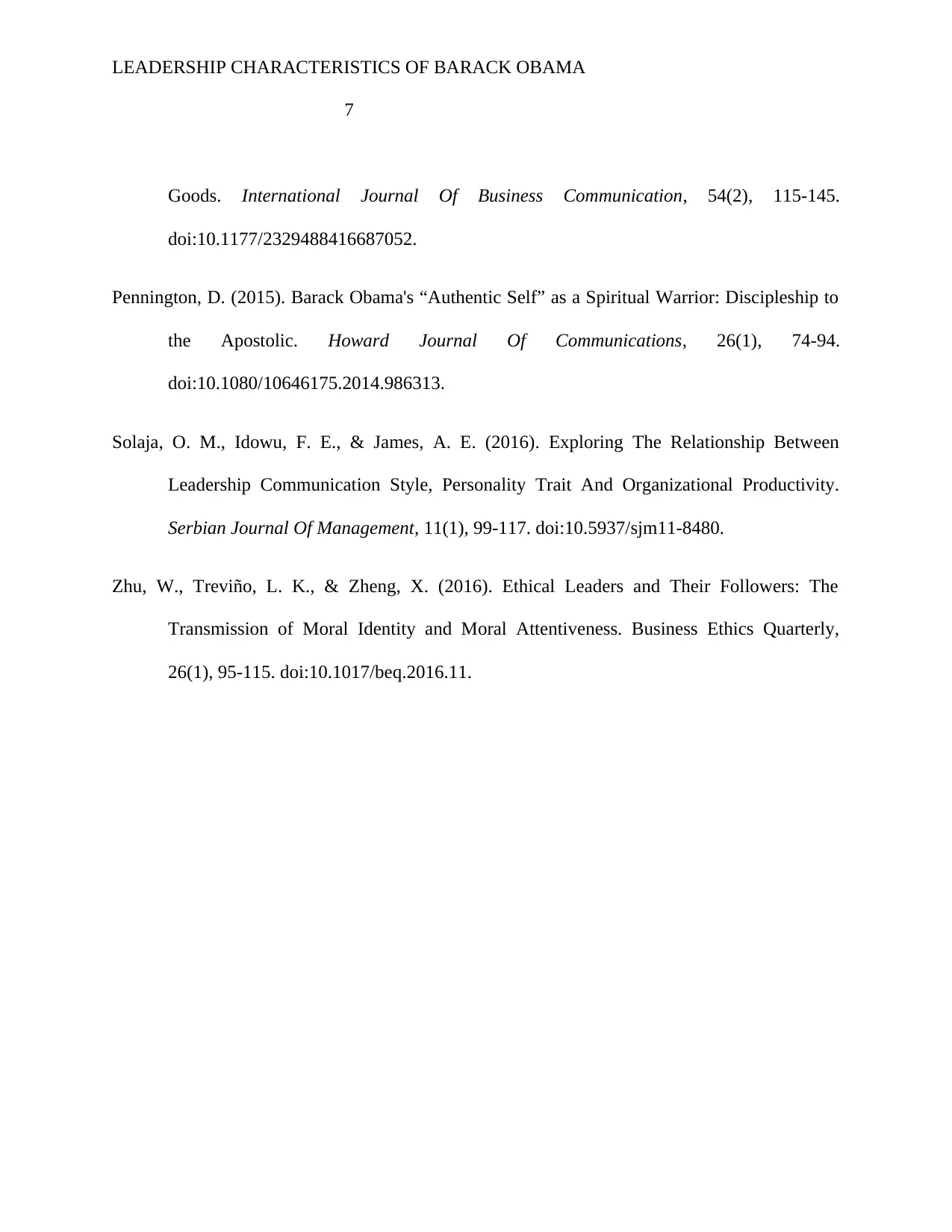
LEADERSHIP CHARACTERISTICS OF BARACK OBAMA
7
Goods. International Journal Of Business Communication, 54(2), 115-145.
doi:10.1177/2329488416687052.
Pennington, D. (2015). Barack Obama's “Authentic Self” as a Spiritual Warrior: Discipleship to
the Apostolic. Howard Journal Of Communications, 26(1), 74-94.
doi:10.1080/10646175.2014.986313.
Solaja, O. M., Idowu, F. E., & James, A. E. (2016). Exploring The Relationship Between
Leadership Communication Style, Personality Trait And Organizational Productivity.
Serbian Journal Of Management, 11(1), 99-117. doi:10.5937/sjm11-8480.
Zhu, W., Treviño, L. K., & Zheng, X. (2016). Ethical Leaders and Their Followers: The
Transmission of Moral Identity and Moral Attentiveness. Business Ethics Quarterly,
26(1), 95-115. doi:10.1017/beq.2016.11.
7
Goods. International Journal Of Business Communication, 54(2), 115-145.
doi:10.1177/2329488416687052.
Pennington, D. (2015). Barack Obama's “Authentic Self” as a Spiritual Warrior: Discipleship to
the Apostolic. Howard Journal Of Communications, 26(1), 74-94.
doi:10.1080/10646175.2014.986313.
Solaja, O. M., Idowu, F. E., & James, A. E. (2016). Exploring The Relationship Between
Leadership Communication Style, Personality Trait And Organizational Productivity.
Serbian Journal Of Management, 11(1), 99-117. doi:10.5937/sjm11-8480.
Zhu, W., Treviño, L. K., & Zheng, X. (2016). Ethical Leaders and Their Followers: The
Transmission of Moral Identity and Moral Attentiveness. Business Ethics Quarterly,
26(1), 95-115. doi:10.1017/beq.2016.11.
1 out of 7
Related Documents
Your All-in-One AI-Powered Toolkit for Academic Success.
+13062052269
info@desklib.com
Available 24*7 on WhatsApp / Email
![[object Object]](/_next/static/media/star-bottom.7253800d.svg)
Unlock your academic potential
Copyright © 2020–2025 A2Z Services. All Rights Reserved. Developed and managed by ZUCOL.





